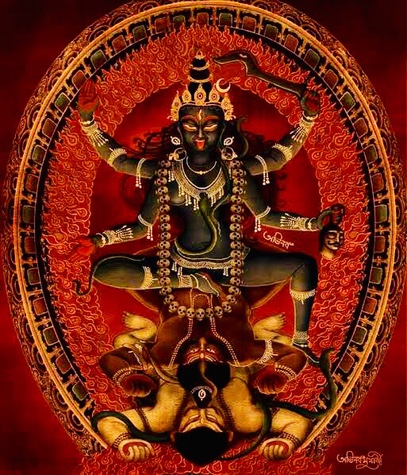PRAYER AT THE FEET OF SRI SRI KĀLIKĀ
May the Maha-Devi who is called Kalika, Because She is without beginning or end,
Whose Body is imagined to be blue of colour, Because like the blue sky She pervades the World, And because She is Cidghana Sattvagunamayi.
Who is imagined to be black Because She is colourless and above the coloured Gunas,
Whose hair is dishevelled (Muktakesi) Because though Herself changeless She binds infinite numbers of Jivas by bonds of Maya, symbolized by Her dishevelled hair and because She makes liberated (Mukta) Braha, Visnu and Mahesvara who are Kesa.
Who is imagined as having the Sun, Moon and Fire as Her three eyes, Because as the Virad, the Witness of the world past, present and future She sees everything,
Who is pictured as wearing the dead bodies of two boys as Her ear-ornaments, Because as said in Āgama and Nigama the childlike and unperturbed (Nirvikara) Sadhaka is very dear to Her,
Who being the sole Creatrix, Preserver and Destructress of infinite millions of Worlds, has on Her Body the mark of the Yoni signifying creation, full and high breasts denoting preservation, and a terrible visage signifying the withdrawal of all things,
Who is said to have large teeth, and a lolling tongue and to hold in Her hand a cup made of human skull, Because the Cinmayi Mahadevi drinks the wine of delusion arising from the Tamas Guna of Her Sadhaka by means of Sattva-pradhana rajoguna,
Who is pictured as wearing a garland of severed heads, Because She is Sabdabrahman (Sabdabrahmarupini) and the heads are the fifty letters,
Whose upper and lower right hands are seen to be making the Abhaya and Vara Mudras, Because She both destroys the dangers, and grants the desires of Sakama-Sadhakas,
Whose upper left hand is depicted as wielding a sword. Because She severs the bonds of illusion for the Niskama-Sadhaka,
Whose lower left hand is seen to hold a human head, Because She grants him Tattvajnana,
Who is called Digambari (space-clad) Because being Brahman (Brahmarupini) She is free from the covering of Maya and unconcerned (Nirvikara),
Who is pictured as having a waist-chain of human hands, Because hands are the principal instrument of work (Karma) and at the close of a Kalpa all Jivas with their Karmas are merged in the Avidya Sakti of Mahaaya,
Who is seen standing on the breast of corpse-like Siva, Because the Supreme State (Paramapada) and Svarupavastha or Mahadevi (one with Siva) is Nirguna and changeless (Nirvikara),
Who is seen in Viparita-maithuna with Mahakala, Because at the beginning of a Kalpa She who is ever blissful (Nityanandamayi), and being united with Siva, feels pleasure in the work of creation which She effects by bringing the changeless Parasiva under Her dominion (Vasibhuta),
Who is again said to live in the cremation ground, Because when at the end of a Kalpa all things in the universe from Braha to a blade of grass are dissolved in Mahakala, She is in and one with that Mahakala, who may be thus compared to a cremation ground, and because at the death of Jivas She exists as the individual (Vyasti) Jivata in the burning ground,
Whose Yantra for worship is composed of a circle symbolizing Maya, an eight-petalled lotus denoting the eightfold Prakṛti, three Pentagons representing the fifteen Avayavas and a Bindu denoting Siva-Sakti, Because She is, as Paraata, in the gross and subtle bodies consisting of the three Gunas and twenty-four Tattvas,
Whose Bija ‘Krim‘, the Queen of Mantras is pure Sattva Guna, and consciousness (Caitanyamayi) and grants both Enjoyment and Liberation,
Who is worshipped as Daksina because She alone grants the full fruits of all forms of Upasana and Yajna.
May She, this Mahadevi, who is Saccidanandarupini and forgiveness itself, pardon all offences committed by me in the explanation of this Her Hymn. Sambhu with His five mouths is unable to relate Thy qualities.
Pardon all my childishness. Be propitious. Guard my life, guard my repute and guard my wife, sons and wealth. And at death grant me Liberation. O Mother of the World, obeisance.
SRI VIMALĀNANDA-SVĀMI
Hymn to Kālī by Arthur Avalon







